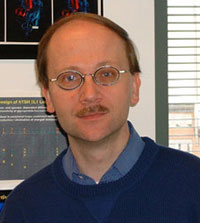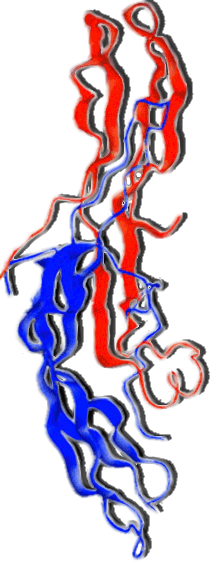Dr.
Weintraub has more than 30 years experience in a biomedical research career
that has focused on molecular, cellular, clinical and therapeutic aspects
of glycoprotein hormones, related growth factors, thyroid hormone and
their receptors. He is the author of over 300 scientific  papers,
reviews and book chapters. In addition has several issued and pending
patents related to the cloning of the human TSH beta subunit, development
of recombinant TSH, and development of superactive analogs of TSH, gonadotropins
and related cystine knot growth factors. He is well known for his basic
science work related to pituitary and recombinant TSH synthesis, glycosylation
and action, affinity chromatography as well as clinical aspects of syndromes
of inappropriate TSH secretion. In addition he was among the first to
recognize and define the clinical and molecular aspects of thyroid hormone
resistance, TSH- producing pituitary tumors and ectopic production of
placental hormones and free subunits by various tumors. He is particularly
recognized for his role as coinventor, codeveloper and a leading investigator
in the international clinical trials of recombinant TSH, approved by the
FDA in 1998 for the diagnosis of thyroid cancer, which has revolutionized
the approach world -wide to that disease.
papers,
reviews and book chapters. In addition has several issued and pending
patents related to the cloning of the human TSH beta subunit, development
of recombinant TSH, and development of superactive analogs of TSH, gonadotropins
and related cystine knot growth factors. He is well known for his basic
science work related to pituitary and recombinant TSH synthesis, glycosylation
and action, affinity chromatography as well as clinical aspects of syndromes
of inappropriate TSH secretion. In addition he was among the first to
recognize and define the clinical and molecular aspects of thyroid hormone
resistance, TSH- producing pituitary tumors and ectopic production of
placental hormones and free subunits by various tumors. He is particularly
recognized for his role as coinventor, codeveloper and a leading investigator
in the international clinical trials of recombinant TSH, approved by the
FDA in 1998 for the diagnosis of thyroid cancer, which has revolutionized
the approach world -wide to that disease.
Dr.
Weintraub obtained his BA from Princeton University magna cum laude where
he was elected to Phi Beta Kappa and his MD from Harvard University cum
laude where he was elected to Alpha Omega Alpha. His postdoctoral clinical
and basic science training were at Harvard and the National Insitutes
of Health and he later served as Assistant Professor at Harvard. In 1972
he became the first Director of the NIH Endocrinology Training Program
and later Chief of its Molecular and Cellular Endocrinology Branch, positions
he held until 1995. In both these positions he helped train a generation
of leading international academic and clinical endocrinologists. From
1996- 2001 he was Professor of Medicine at the University of Maryland
at Baltimore, Chief of the Laboratory of Molecular Endocrinology of the
Institute of Human Virology of the University of Maryland Biotechnology
Institute and Director of the Thyroid Cancer Program of the Greenebaum
Cancer Center. He has received numerous international awards and lectureships,
is a member of many scientific research organizations, served on several
journal editorial boards as well as on several advisory committees to
NIH and various universities. He has also served on the Council of the
Endocrine Society and the American Thyroid Association as well as President
of the Maryland Endocrine Society.
Mariusz
W. Szkudlinski, MD, PhD
Executive Vice President, Chief Scientific Officer & Co-Founder
Dr.
Szkudlinski has more than twenty years of experience in biomedical research.
He is an author or co-author of more than 70 scientific papers, reviews,
book chapters, patents and patent applications. His work includes a
landmark paper entitled "Engineering human glycoprotein  hormone superactive analogs" that has been recognized as "the
advent of super hormone drugs" and an important achievement in
protein engineering (Analysis Research News, Nature Biotechnology 14,
1224, 1996; Molecular Biology and Biotechnology, 4th Edition, The Royal
Society of Chemistry, London 2000). In addition to his design of the
first superactive analogs of glycoprotein hormones and VEGF, Dr. Szkudlinski
contributed to better understanding of changes in the bioactivity of
glycoprotein hormones during evolution and the development of novel
strategies in the design of therapeutically useful cystine-knot growth
factor superactive analogs. His previous work also includes studies
on prostaglandins, local renin-angiotensin system, production and characterization
of recombinant TSH isoforms, development of various bioassays as well
as elucidation of the role of carbohydrate chains in TSH activity, metabolic
clearance and organ distribution. Dr. Szkudlinski and his colleagues
have identified novel domains in TSH and gonadotropins important in
hormone-receptor interaction, designed long-acting analogs based on
site-specific pegylation, glycosylation or subunit linking,, and more
recently provided new important insights into the mechanism of hormone
dependent and independent receptor activation.
hormone superactive analogs" that has been recognized as "the
advent of super hormone drugs" and an important achievement in
protein engineering (Analysis Research News, Nature Biotechnology 14,
1224, 1996; Molecular Biology and Biotechnology, 4th Edition, The Royal
Society of Chemistry, London 2000). In addition to his design of the
first superactive analogs of glycoprotein hormones and VEGF, Dr. Szkudlinski
contributed to better understanding of changes in the bioactivity of
glycoprotein hormones during evolution and the development of novel
strategies in the design of therapeutically useful cystine-knot growth
factor superactive analogs. His previous work also includes studies
on prostaglandins, local renin-angiotensin system, production and characterization
of recombinant TSH isoforms, development of various bioassays as well
as elucidation of the role of carbohydrate chains in TSH activity, metabolic
clearance and organ distribution. Dr. Szkudlinski and his colleagues
have identified novel domains in TSH and gonadotropins important in
hormone-receptor interaction, designed long-acting analogs based on
site-specific pegylation, glycosylation or subunit linking,, and more
recently provided new important insights into the mechanism of hormone
dependent and independent receptor activation.
Dr. Szkudlinski obtained his M.D. and Ph.D. degrees from the Medical University
of Lodz in Poland. His postdoctoral training included the Institute of
Hormone and Fertility Research in Hamburg (Germany) and the National Institutes
of Health in Bethesda. Prior to co-founding Trophogen, Inc., Dr. Szkudlinski
was an Assistant Professor and Chief of Protein Engineering Section in
the Laboratory of Molecular Endocrinology in the University of Maryland.
In that capacity, he was responsible for several structure-function and
protein engineering projects within the Laboratory of Molecular Endocrinology
and the Division of Basic Science of the Institute of Human Virology (UMBI).
He has received numerous awards for excellence in research, presented
his work at many national and international meetings, lectured at various
universities, including Harvard Reproductive Science Center. He has trained
numerous students and postdoctoral fellows. He serves as a reviewer in
several leading journals and was invited to several national and international scientific
panels. He was a member of the American Thyroid Association Research
Committee and a member of Editorial Board of Molecular and Structural Endocrinology at Frontiers in Endocrinology.
 back
to top
back
to top
Staff
Dr. Avijit Majumdar, PhD
Scientist, Research & Development
Dr. Avijit Majumdar, Ph.D., received his doctoral degree specializing in Cell & Molecular Biology from the School of Biomedical Sciences at Kent State University, Ohio on 2008. During his doctoral research, he made two key discoveries
 which include determining the mechanism of action of anti-angiogenic drug fumagillin at the cellular level and identifying novel tumor suppressor function of MetAP2/P67 which is a known regulator of protein synthesis machinery. He was the recipient of the ‘Excellence in Research’ and Research Grant Award’ at Kent State University. Following his doctoral degree, he joined as a postdoctoral fellow in the Department of Pharmacology at Case Western Reserve University, Ohio, where he worked on the posttranslational modification of retinoic acid transporter protein, cellular retinoic acid binding protein – II (CRABP-II). Following this he joined as a postdoctoral fellow in the Department of Gastroenterology, Hepatology & Nutrition at the University of Texas MD Anderson Cancer Center and was later promoted to the Senior Research Scientist position. His research was focused on understanding the mechanistic role of carcinoembryonic antigen (CEA), a widely used marker for determining the recurrence of colorectal cancer (CRC), in promoting CRC metastasis and identification of novel prognostic markers for early detection of aggressively proliferating CRC. He received the ‘Poster of Distinction’ award in the ‘Digestive Disease Week’ annual conference on 2013. He is currently working on identification of novel therapeutic strategies for metastatic thyroid cancer patients.
which include determining the mechanism of action of anti-angiogenic drug fumagillin at the cellular level and identifying novel tumor suppressor function of MetAP2/P67 which is a known regulator of protein synthesis machinery. He was the recipient of the ‘Excellence in Research’ and Research Grant Award’ at Kent State University. Following his doctoral degree, he joined as a postdoctoral fellow in the Department of Pharmacology at Case Western Reserve University, Ohio, where he worked on the posttranslational modification of retinoic acid transporter protein, cellular retinoic acid binding protein – II (CRABP-II). Following this he joined as a postdoctoral fellow in the Department of Gastroenterology, Hepatology & Nutrition at the University of Texas MD Anderson Cancer Center and was later promoted to the Senior Research Scientist position. His research was focused on understanding the mechanistic role of carcinoembryonic antigen (CEA), a widely used marker for determining the recurrence of colorectal cancer (CRC), in promoting CRC metastasis and identification of novel prognostic markers for early detection of aggressively proliferating CRC. He received the ‘Poster of Distinction’ award in the ‘Digestive Disease Week’ annual conference on 2013. He is currently working on identification of novel therapeutic strategies for metastatic thyroid cancer patients.
 back
to top
back
to top

